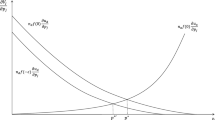Abstract
This paper develops a model of political consensus in order to explain the missing link between inequality and political redistribution. Political consensus is an implicit agreement not to vote for extreme policy proposals. We show that such an agreement may play an efficiency-enhancing role. Voters anticipate that voting for extremist parties increases policy uncertainty in the future. A political consensus among voters reduces policy uncertainty because self-interested politicians propose non-discriminatory policies. We study how much inequality can be sustained in a democracy and how the limits to redistribution vary with initial inequality. The bounds of the set of political equilibria may react in a fundamentally different manner to changes in exogenous variables than do the policy variables in the one-dimensional, one-shot game. More initial inequality need not lead to more redistribution from the rich to the poor. The maximum amount of redistribution decreases with inequality if (and only if) agents are sufficiently patient. In this case inequality is politically self-sustaining.
Similar content being viewed by others
References
Alesina A., Angeletos G.M. (2005) Fairness and redistribution: US versus Europe. American Economic Review 95: 913–935
Alesina A., La Ferrara E. (2005) Preferences for redistribution in the land of opportunities. Journal of Public Economics 89: 897–931
Alesina A., Rodrik D. (1994) Distributive politics and economic growth. Quarterly Journal of Economics 109: 465–490
Artale A., Grüner H.P. (2000) A model of stability and persistence in a democracy. Games and Economic Behavior 33: 20–40
Benabou R. (2000) Unequal societies: income distribution and the social contract. American Economic Review 90: 96–129
Bertola G. (1993) Market structure and income distribution in endogenous growth models. American Economic Review 83: 1184–1199
Besley T., Coate S. (1998) Sources of inefficiency in a representative democracy: a dynamic analysis. American Economic Review 88: 139–156
Clarke G.R.G. (1995) More evidence on income distribution and growth. Journal of Development Economics 47(2): 403–427
Corneo G., Grüner H.P. (2000) Social limits to redistribution. American Economic Review 90: 1491–1507
Corneo G., Grüner H.P. (2002) Individual preferences for political redistribution. Journal of Public Economics 83: 83–107
Coughlin P. (1986) Elections and income redistribution. Public Choice 50: 27–91
Dasgupta P., Maskin E. (1986) The existence of equilibrium in discontinious games, I: theory. Review of Economic Studies 53: 1–26
Duggan J., Fey M. (2006) Repeated Downsian Electoral competition. International Journal of Game Theory 35: 39–69
Epple D., Riordan M.H. (1987) Cooperation and punishment under repeated majority voting. Public Choice 55: 41–73
Grüner H.P. (2003) Redistribution as a selection device. Journal of Economic Theory 108: 194–216
Grüner H.P., Schils R. (2007) The political Economy of Wealth and Interest. Economic Journal 117(523): 1403–1422
Kramer G. (1977) A dynamical model of political equilibrium. Journal of Economic Theory 16: 310–334
Mas-Colell A., Whinston M.D., Green J.R. (1995) Microeconomic Theory. Oxford University Press, New York, Oxford
Mc Kelvey R.D. (1987) General conditions for global intransitivities in formal voting models. Econometrica 47: 1085–1112
Meltzer A.H., Richards S.F. (1981) A rational theory of the size of government. Journal of Political Economy 89: 914–927
Mueller D. (1990) Public Choice II. Cambridge, MA: Cambridge University Press
Ordeshook P.C. (1980) Political disequilibrium and scientific inquiry, comment on Riker (1980). American Political Science Review 74: 447–450
Ordeshook P.C. (1988) Game Theory and Political Theory. Cambridge: Cambridge University Press
Perotti R. (1992) Income distribution, politics and growth. American Economic Review Papers and Proceedings 82: 311–316
Perotti R. (1993) Political equilibrium, income distribution, and growth, Proof of Lemma 8. Review of Economic Studies 60: 755–776
Perotti R. (1996) Democracy, income distribution and growth: what the data say. Journal of Economic Growth 1: 149–187
Persson T., Tabellini G. (1994) Is inequality harmful for growth?. American Economic Review 84: 600–621
Piketty T. (1995) Social mobility and redistributive politics. Quarterly Journal of Economics 110: 551–584
Rae D. (1980) An alimeter for Mr. Escher’s stairway. comment on Riker (1980). American Political Science Review 74: 451–458
Riker W.H. (1980) Implications from the disequilibrium of majority rule for the study of institutions. American Political Science Review 74: 432–446
Roemer, T. (1975), Individual welfare, majority voting, and the properties of a linear income tax, Journal of Public Economics 163–185.
Roemer J.E. (1998) Why the poor do not expropriate the rich: an old argument in a new garb. Journal of Public Economics 70: 399–424
Roberts, K. (1977), Voting over income tax schedules, Journal of Public Economics 329–340.
Author information
Authors and Affiliations
Corresponding author
Rights and permissions
About this article
Cite this article
Grüner, H.P. Inequality and Political Consensus. Theory Decis 67, 239–265 (2009). https://doi.org/10.1007/s11238-008-9096-0
Received:
Accepted:
Published:
Issue Date:
DOI: https://doi.org/10.1007/s11238-008-9096-0
Keywords
- Inequality
- Representative democracy
- Political consensus
- Policy uncertainty
- Comparative statics in political economy




